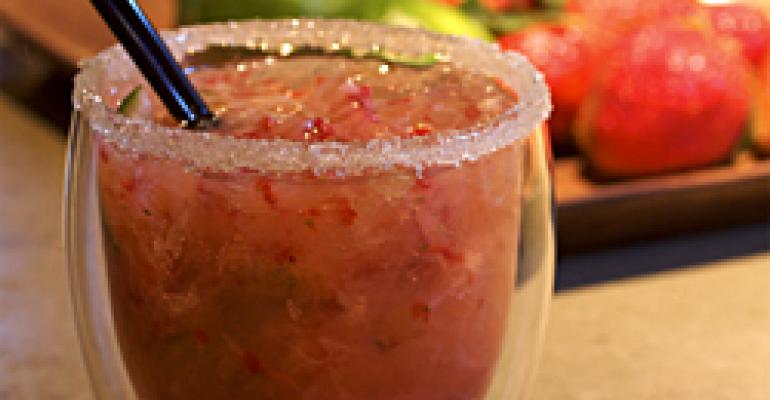Eager to court eco-conscious consumers and express their own convictions, some operators are seeding cocktail, wine and beer lists with organic products, touting green wine tastings and vintner dinners and taking their own small steps toward reversing the planet’s environmental plight.
Certified organic beverages follow the requirements of the U.S. Department of Agriculture’s National Organic Standards Board. They are made from crops raised without most conventional pesticides, petroleum-based fertilizers or sewage-sludge-based fertilizers. Although it’s debatable whether a shot of organic vodka is actually “better for you” than a non-organic one, there is a shared sentiment in favor of keeping synthetic chemicals out of farmland and groundwater. What’s more, with eco-mindedness and organic foods both becoming increasingly mainstream, a slate of green drinks may be an added draw for some customers.
“We want to offer guests options, whether it’s to reuse the linen in the guest room, to get a newspaper or not, or to order organic food, beer, wine and spirits,” said Dan Hoffman, director, equipment and beverage specifications, for Washington, D.C.-based Marriott International. Guests have been showing increasing interest in organic beverages in the last several years, he noted.
About 300 full-service hotels participate in the Marriott beverage program. Organic spirits are mandated for JW Marriott luxury properties and optional for other company brands. The selection covers vodka, gin, tequila, rum, Scotch whisky and cordials, including emerging microdistilled spirits.
“Some categories are challenging, because there’s not a lot of organic bourbon or organic single malt Scotch being made,” Hoffman said.
One of the selling points of organic beverages is that they often have underlying stories that resonate with consumers, Hoffman said.
“For example, Tru Organic Vodka plants a tree in the rainforest for every bottle it sells,” said Hoffman.
In fact, the brand claims to be carbon negative, meaning that it offsets more carbon dioxide in the environment than it produces. Another example is Prairie Organic Vodka, made from organic corn grown by a farmer-owned co-op, which gives farmers an alternative to the volatile commodities market.
At Feast, a neighborhood restaurant in Chicago, wine buyer Brett Heiar was expecting a good turnout of people for “Go Green for Spring,” an organic wine tasting.
“I’m a huge fan of sustainably farmed wines,” said Heiar, who noted that description describes about 90 percent of Feast’s 100 bottles. He also promotes Brasserie Lebbe, a French farmhouse ale made from organically grown barley.
At Akasha Restaurant, Bar and Bakery in Culver City, Calif., organic cocktails are apropos of a “green-minded restaurant,” as chef-owner Akasha Richmond puts it, along with organic foods and natural décor accents like reclaimed wood and hemp fabrics.
“We want the cocktails to complement the whole theme of the restaurant and the way that I cook,” said Richmond, a proponent of seasonal and local New American cuisine.
Green literally as well as figuratively is her Emerald City, a drink made with Juniper Green Organic Gin, house-made basil elixir and fresh lime, priced at $11. In the same vein are The Akasha, made with Crop Organic Cucumber Vodka and organic pineapple and cucumber juice, which also sells for $11; and the Hibiscus Margarita, featuring 4 Copas Organic Tequila, hibiscus elixir, grapefruit juice and lime, for $14.
“Changing the world one meal at a time” is the slogan of GustOrganics, which bills itself as the first and only certified organic restaurant in New York City and the first and only certified organic bar in the world. Its organic libations include the Pepino, made with vodka, fresh cucumber, mint, orange juice and agave, and priced at $13; the Strawberry Caipiroska, made with vodka, fresh strawberries and sugar, priced at $12; and frozen margaritas made with tequila, lime, orange juice and agave, priced at $12.
“Customers like it very much because there are no chemicals, no hormones, no pesticides — just like everything we have been doing so far,” said founder and chief executive Alberto Gonzalez.
Organic wines tend to attract customers who are “a little more maverick” in their tastes, according to Levi Dalton, sommelier of Convivio, a Southern Italian restaurant in New York City.
Dalton is hosting an upcoming dinner with five Italian vintners who not only work organically but also produce some of Italy’s most unique wines. Guests include Occhipinti, a Sicilian winery that bottles a rare 100-percent Frappato, and Guttarolo, a producer in Puglia that ages Primitivo in clay amphorae a la the ancient Etruscans.
“I get a lot of phone calls and emails from guests asking where they can find certain wines they’ve had here,” said Dalton. “Once people try these wines, they become very eager to have them again.”




